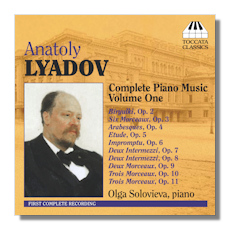
The Internet's Premier Classical Music Source
Related Links
- Liadov Reviews
- Latest Reviews
- More Reviews
-
By Composer
-
Collections
DVD & Blu-ray
Books
Concert Reviews
Articles/Interviews
Software
Audio
Search Amazon
Recommended Links
Site News
 CD Review
CD Review
Anatoly Lyadov (Anatol Liadov)

Complete Piano Music, Volume One
- Biryulki, Op. 2 (1876)
- Six Morceaux, Op. 3 (1876-77)
- Arabesques, Op. 4 (1878)
- Etude, Op. 5 (1881)
- Impromptu, Op. 6 (1881)
- Deux Intermezzi, Op. 7 (1881)
- Deux Intermezzi, Op. 8 (1883)
- Deux Morceaux, Op. 9 (1883)
- Trois Morceaux, Op. 10 (1884)
- Trois Morceaux, Op. 11 (1885)
Olga Solovieva, piano
Includes first recordings
Extensive notes by Anastasia Belina
Toccata Classics TOCC0082 64:41
Lyadov (1855-1914) entered the St. Petersburg Conservatory at age fifteen or sixteen and was expelled five years later for not showing up at class. Readmitted, he completed his studies brilliantly with a composition based on the final scene of Schiller's Die Braut von Messina, in 1878, following which he became an instructor of theory at the Conservatory. He never lost his reputation for indolence and he never completed a long work. With Balakirev he collected folk songs and in his later years he taught counterpoint and composition. He studied with Rimsky-Korsakov – which shows in his orchestral music – and taught Miaskovsky and Prokofiev. From the latter he could not have been more different in nearly every respect.
For that matter, Lyadov's early piano pieces presented here could not be more different from the late orchestral pieces, Baba-Yaga, The Enchanted Lake, Kikimora and The Musical Box, which represent my previous acquaintance with the works of this composer. The titles just mentioned are lush – and luscious – examples of the kind of music that the "Mighty Five" wrote. The piano music is more in the spirit of Schumann or Chopin (though I was reminded of Gottschalk in the very first piece here): even the titles of Liadov's various movements, which include eight mazurkas, three preludes, an etude, a waltz, and an impromptu represent forms Chopin is known for, and Schumann wrote an Arabesque. Older forms Lyadov used include fugue and gigue. There is not much here that many would call lush, especially as Solieva plays it, but it is interesting to hear the very different young Lyadov.
Op. 2 has fourteen varied movements in less than twelve minutes. Stipulated tempos range from Moderato to Prestissimo, with an Allegretto tranquillo that is performed more briskly than I might want it. Solovieva's playing playing is consistently brilliant and the Allegro con fuoco certainly blazes. Op. 3 begins with three baroque forms and continues with three mazurkas. The four arabesques are all fast, including most of the Allegretto.
Most of this music is vigorous but the intensity of the Intermezzi particularly caught my attention. The mazurka in Op. 9 was a piece I especially would like to hear at a more relaxed pace, similar to, for instance, the playing of the lovely prelude in Op. 11; that would bring out its expressiveness more and lose nothing in the process. Belina notes that Op. 11 shows more similarity to the works of the Russian nationalists than do Lyadov's earlier pieces, with folk music influence.
My overall impression of the disc is of well-made little pieces played with pianistic brilliance. Listening to thirty eight bands of this can be a fatiguing way to spend an hour. Best to make several sessions of it.
Copyright © 2010, R. James Tobin





















